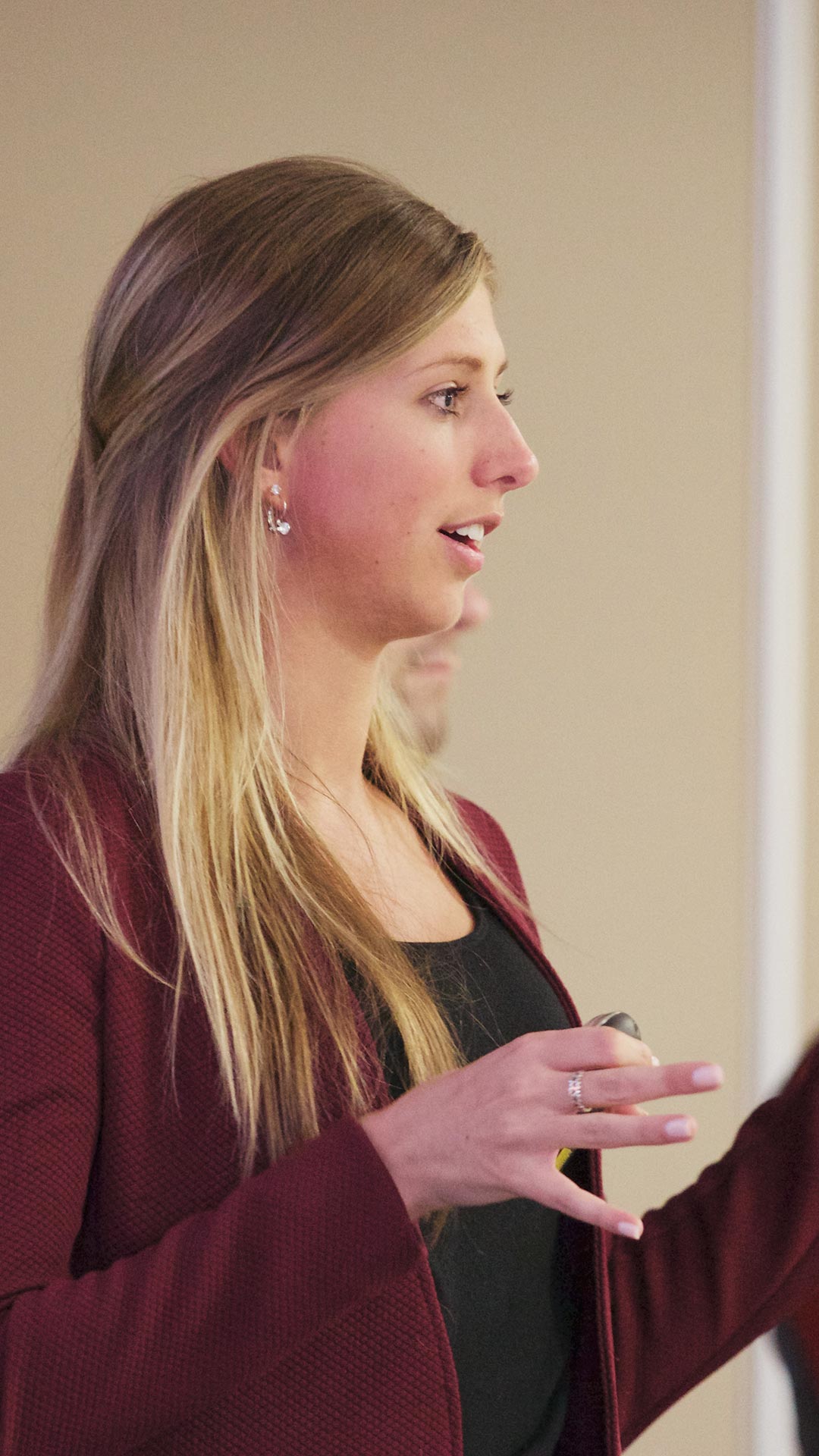Accounting Courses
Honours Major: Business Accounting (28 courses)
Four-Year Major: Business Accounting (24 courses)
Learn more about the Co-op Program in Business Accounting
Course Details
Introduction to Business BUS-121
Discover the crucial role business plays in your life as a consumer and employee. Relate the purpose and necessity of profit to a business’s goals for employees, suppliers, the community, the environment, and other stakeholders. Use effective marketing, financial management, and people strategies, combined with the right form of business ownership, to achieve those goals.
Prerequisites:
Normally required in Year 1 for Business students
Introduction to Management Decisions BUS-122
Prepare yourself for the wide range of business decisions managers make on a dailybasis. Compete against other teams as you run your own simulated business. Using case studies, practice analyzing financial reports, marketing data, and other information to make marketing, operating, human resource, accounting, and finance decisions.
Prerequisites:
BUS-121Normally required in Year 1 for Business students
Introduction to Financial Accounting BUS-127
Begin to speak accounting, the “language of business”. Learn how transactions and events related to cash, receivables, long-lived assets, liabilities, and equity are captured in financial terms and are compiled into financial statements. Read and interpret financial statements, and compare performance from one year to the next or one business to the next.
Prerequisites:
BUS-121
Corequisites:
BUS-121
Introduction to Managerial Accounting BUS-204
Apply basic tools to determine what it costs to deliver products and services, what activities drive costs up or down in your business, what volume of business you need to achieve your desired level of profit, and what costs are relevant for making decisions about special orders, make or buy decisions, product pricing, and capital investments. Prepare and use budgets to translate your business goals into monetary terms.
Prerequisites:
Recommended:
BUS-127Year 2 standing
Management Information Systems BUS-225
Discover the strategic role of information technology and management information systems in organizations. Learn about hardware and software. Gather, analyze, and use data, information, and knowledge to make well-informed business decisions.
Prerequisites:
BUS-121Year 2 standing
Finance I BUS-236
Learn how businesses obtain and use cash and other sources of financing. Realize the time value of money and how it impacts short- and long-term financing decisions. Apply financial statement analysis and financial forecasting techniques. Use tools to effectively obtain and manage short-term sources of financing. Look ahead to long term investment and financing decisions that will be the focus of BUS-336, including capital budgeting.
Prerequisites:
BUS-127Year 2 standing
Organizational Behaviour BUS-241
Develop insight into how individuals and teams behave in organizations. Harness values, perceptions, attitudes, communication, power, conflict and change management, and organizational design to motivate and equip people to accomplish organizational goals.
Prerequisites:
BUS-121,
BUS-122Year 2 standing
Introduction to Marketing BUS-255
Discover how organizations create value and connect with customers through relationships and technology. Examine market segmentation, select a target market, position a company in relation to the competition, analyze new product development and brand management strategies, and develop an effective marketing mix (e.g., product, place, promotion, pricing).
Prerequisites:
BUS-121,
BUS-122Year 2 standing
Intermediate Financial Accounting I BUS-313
Learn how to accurately and honestly measure revenue, profit, and organizational resources such as cash, inventory, property, plant, and equipment. Recognize the potential for bias and manipulation in financial reporting. Analyze and evaluate financial results in the context of organizational strategies, as well as economic, industry, and competitive trends.
Prerequisites:
BUS-127
Introductory Assurance Services BUS-315
Discover the auditor’s important role in assuring users that they can rely on financial statements for decision-making purposes. Develop an audit plan based on a sound understanding of professional ethics, legal liability, types of audit evidence, and internal controls. Apply the audit process to various operating cycles.
Prerequisites:
BUS 313 or BUS 317
Corequisites:
BUS 313 or BUS 317
Intermediate Financial Accounting II BUS-317
Learn how to accurately and honestly measure liabilities, including income tax, pension, and lease obligations; shareholders’ equity; and complex instruments that contain elements of debt and equity. Calculate and interpret earnings per share. Prepare and analyze the statement of cash flows. Implement other financial reporting requirements and use the information they provide.
Prerequisites:
BUS-127
Management Control Systems BUS-318
Discover how management control systems direct behaviour towards achievement of organizational strategies and goals. Design and evaluate control systems. Develop effective budgeting systems, incentive systems, and corporate governance systems. Evaluate progress towards organizational goals using a broad range of short- and long-term measures.
Prerequisites:
BUS-204
Canadian Income Taxation I BUS-319
Learn about the obligations Canadian income tax legislation places on individuals to pay tax on income from employment, business, and other sources. Use your knowledge of taxation principles and concepts related to income and allowable deductions to calculate taxable income and tax payable for individuals.
Prerequisites:
BUS-127
Business Law BUS-335
Learn how the Canadian legal and justice system provides a framework governing contracts, negligence and other torts, property rights and obligations, employment rights and obligations, debtor-creditor relationships, forms of business, and dispute resolution.
Finance II BUS-336
Building on Finance I, learn about long-term investment and financing decisions, including how capital markets function, how to choose between debt and equity financing, and how to choose between public and private financing. Delve into the ever-changing world of hybrid debt/equity instruments, derivative securities, mergers and acquisitions, and international financing.
Prerequisites:
BUS-236
Human Resource Management BUS-341
Learn how to get the right people in the right jobs at the right time and for the right price. Help employees develop their gifts and abilities, assess their performance on the job, and prepare them for successful careers.
Prerequisites:
BUS-241Year 3 standing
Operations Management BUS-345
Learn how to manage the processes used to transform inputs into products and services. Design products, select production processes, and layouts, forecast product/service demand, manage supply chains, schedule production, and ensure quality.
Prerequisites:
BUS-204
Personal Finance BUS-353
Equip yourself with the tools and skills you need to make sound financial decisions throughout your life as you earn, save and spend money. Learn how to make wise decisions about everything from student debt to car loans to mortgages to insurance to retirement.
Antirequisites:
BUS-253
International Business BUS-363
Discover the implications of doing business internationally, including being impacted by world economies, trade tariffs and quotas, cultural differences, and government policies. Analyze how being an international business affects management of human resources, marketing, finance, and other business functions.
Prerequisites:
ECO-122BUS-255 or POL-215
Cost and Managerial Accounting BUS-414
Determine the cost of activities, products, and services; use that information to make management decisions. Investigate how budgets and responsibility accounting affect behaviour. Compare actual and expected results; and analyze how to improve future results. Evaluate strategic investment decisions using
advanced capital budgeting techniques.
Prerequisites:
BUS-204
Advanced Financial Accounting BUS-417
Apply financial accounting concepts and techniques to three complex business situations: investments and business combinations; foreign transactions and operations; and not-for-profit and public-sector organizations.
Prerequisites:
BUS-313 or 317
Canadian Income Taxation II BUS-419
Learn about the obligations Canadian income tax legislation places on corporations to pay tax on income from business and other sources. Use your knowledge of taxation principles and concepts to plan and assess the tax implications of shareholder manager remuneration, corporate distributions, wind-ups and sales, income deferral, and partnerships and trusts.
Prerequisites:
BUS-127,
BUS-319
Data Analytics BUS-425
Explore the world of data. Discover how to transform data and develop the insights needed to make wise, practical, creative, and innovative decisions; to solve problems; and to evaluate organizational or project results. Using appropriate analytic tools like spreadsheets and statistical software, delve into the data generated in all disciplines and functional areas of business.
Prerequisites:
PSY-210 or MAT-201
Business Ethics BUS-430
Learn how others make ethical business decisions, and develop a framework for making your own ethical business decisions in a complex global marketplace.
Prerequisites:
Year 4 standing; BUS-430 is the Capstone Course in the Business Department and is required for all majors in the 4th year.
Strategic Management Seminar BUS-465
Learn how to make strategic management decisions in this hands-on course that makes extensive use of the case-study method. Integrate all of the skills and knowledge gained in prior business courses to select the product/market focus, value proposition, and core activities that will successfully align with your organization’s environment, resources, stakeholder preferences, and organizational structures to produce a winning strategy.
Prerequisites:
Year 4 standing and final winter term of studies; BUS-341 recommended
to ensure sufficient experience with case-study method.
Introduction to Economics: Micro ECO-121
An introductory survey of microeconomic principles, problems, and applications. Microeconomics is concerned with the study of the economic behaviour of individual economic units–the industry, firm, or household.
Introduction to Economics: Macro ECO-122
An introductory survey of macroeconomic principles, problems, and applications. Topics include economic goals, the role of the market and government in the economy, and the economic problems of unemployment and inflation.



